Hideyo Noguchi Africa Prize Newsletter No.11
< Newsletter No.10 | Newsletter No.12>
Dr. Brian Greenwood (United Kingdom)
Laureate for the First Hideyo Noguchi Africa Prize,
Medical Research Category
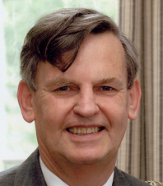
Since I was awarded the first Hideyo Noguchi Africa prize in 2008, I have continued to conduct research in West Africa including research in Ghana, the country where Dr Noguchi conducted his last studies on the cause of yellow fever. My research continues to focus on malaria and meningitis.
Substantial progress has been made in the control of malaria during the past few years but there are still many areas in sub-Saharan Africa where the infection remains stubborn. WHO estimates that in 2013 there were584,000 (range 367,000-750,000) deaths from malaria, the majority of these being in young children in Africa. Thus, new interventions to control malaria are still needed.In 2006, Badara Cisse, a Senegalese PhD student attached to LSHTM and his colleagues, of whom I was one, reported the results of a study undertaken in a rural area of Senegal which showed the dramatic impact on malaria of giving all children under five years of age three course of antimalarials during the short malaria transmissions season. These results were replicated in other countries and, in 2012, WHO recommended that this intervention, now called seasonal malaria chemoprevention (SMC), should be introduced in areas of the African Sahel and sub-Sahel where malaria transmission is very seasonal. Thanks to support from UNITAID, this intervention is now being put into practice and it should save thousands of live in the years to come. I have also been supporting evaluation in Ghana of the most promising candidate malaria vaccine, RTS,S/AS01, which is now under review for potential approval by the European Medicines Agency (EMA).
The areas of the Sahel whereSMC is now being implemented overlap with those where massive epidemics ofmeningococcal meningitis occur every few years during the dry season. Duringthe past five years, I have coordinated a study which has investigated the epidemiology of this infection by studying nasopharyngeal carriage of the causative bacterium Neisseria meningitis. Surprisingly we have found that carriage of N. meningitidis is less frequent in the African meningitis belt than in industrialised countries and this may contribute to the propensity of this area to epidemics. We have also demonstrated the dramatic impact of a new meningococcal serogroup A conjugate vaccine (MenAfriVac) which halted an epidemic Chad.
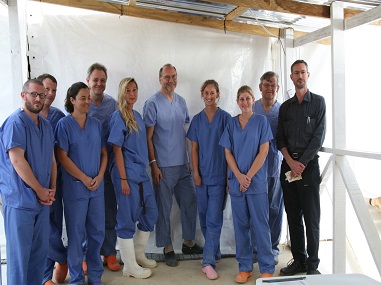
Peter Piot(centre) and Brian Greenwood (second from the right)
with volunteers at Kerry Town Ebola treatment centre,Sierra Leone,
December 2014 (photo Heidi Larson).
In 2014, three countries in West Africa were affected by the largest epidemic of Ebola virus infection that has occurred since the virus was co-discovered by Professor Peter Piot, also a recipient of the Hideyo Noguchi Africa prize, in 1976. Sierra Leone, a country where I worked in the 1990s, has been especially badly affected and I have been keen to do anything I could to help in that country. Thus, I am pleased to have been given the opportunity to assist in the evaluation of a vaccine against Ebola being developed by Johnson and Johnson and before Christmas I made a visit to Sierra Leone together with Professor Piot and Professor Farrar, director of the Wellcome Trust(see photo).We hope to be able to start a phase 3 trial of this vaccine in Sierra Leone in the first half of 2015, an activity which I am sure would have had the support of Dr Noguchi had he still been with us.
Prof. Miriam K. Were (Kenya)
Laureate for the First Hideyo Noguchi Africa Prize,
Medical Services Category
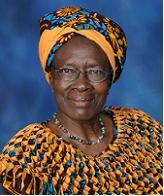
Soon after the award of the first Hideyo Noguchi Africa Prize by Japan in 2008, of which I was one of the two recipients, I got invited by the Chairman of the CHAMPIONS FOR AN HIV/AIDS-FREE GENERATION to join the group under formation. This Chairman was former President of Botswana. Most of the other members were former African Presidents active on issues of HIV/AIDS in their countries (Mozambique, Tanzania & Zambia), a former Vice President (Uganda) and the Retired Arch Bishop of South Africa, Desmond Tutu. I learnt that I had been selected to join the group due to the record of my work as Chairperson of Kenya’s National AIDS Control Council and because I had been internationally recognized by the prize received in Japan. So right away I realized that as a Laureate of the Hideyo Noguchi Africa Prize by Japan, I was in a special category!
The Champions embarked on planning what countries to visit and the nature of those visits; attending and addressing the two yearly International Conference in Africa on Sexually transmitted diseases and AIDS (ICASA) and other African regional and sub-regional meetings. Since then, the Champions have taken turns attending and addressing these meetings and making country visits. Personally, I have participated in three ICASA and seven country visits in which we held open discussions with Heads of state, National Commissions/Councils and traditional leaders at community level thus contributing to strengthening National HIV/AIDS Response and to ending the silence on HIV/AIDS. On 1st December 2014, I launched the document COMMUNITY MATTERS in Johannesburg invited by the Southern Africa AIDS Trust (SAT) that is focusing on community level HIV/AIDS control and management. In April 2015, the Champion’s program will be re-launched.
On Community Health Services, I was the lead Consultant for Kenya’s First National Convention on Community Health Services in 2010 as well as providing on-going Advisory services to the Health Ministry on scaling up Community Health Services towards Universal Health Coverage (UHC). Since July 2014, I am working with Governors in the context of devolved health services to maintain the push towards UHC. With support of JICA Kenya Office, I worked with others on development of Standards that were ratified in 2014 to ensure quality health services at Community level. Within Africa, I have attended WHO/AFRO Regional Meetings to address this and mother and child health services. At Country level, I have been to Ethiopia, Ghana, Malawi and Zambia on review missions. Internationally, at the 3rd Global Forum on Human Resources for Health held in Brazil in 2013, I was recognized as an expert on Community Health Workers (CHWs) and I am in the Expert Team that globally reviews policy and implementation with the Global Health Work Force Alliance.
Mother and Child Health programs continue to be very important. Since 2011, I am in the UNSG’s independent Expert Review Group (iERG) that is globally monitoring MDG 4 and 5 whose findings we present to him in annual reports with the last one scheduled for 2015. In 2012, working with JICA and other Japanese institutions, the first Conference on MCH Handbook was held in Africa with the second one disrupted byEbola in 2014.
Being a Hideyo Noguchi Africa Prize laureate has been exciting and I so much appreciate the professional sharing that Japanese colleagues have extended to me and those I work with. This has involved my participation in meetings/forums in Japan. It has also included participation in planned events by Japanese professionals elsewhere like the workshop I will be attending in Bangkok as a side event during Prince Mahidol Award Conference on 28th January, 2015 in preparation for the 2016 G7/G8 Summit in Japan.
Dr. Peter Piot (Belgium)
Laureate for the Second Hideyo Noguchi Africa Prize,
Medical Research Category
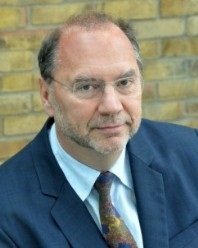
Receiving the 2nd Hideyo Noguchi Africa Prize for Medical Research from Prime Minister Shinzo Abe in the presence of the Emperor was one of the highlights of my career because of the enormous prestige of the award and because Dr Noguchi is a role model for anybody in global health. It combined my passions for science, public health and Africa, with the highest recognition by the Government of Japan.This Prize has formally sealed my engagement with Japan, with friends in government, politics, the University of Tokyo, and Kyoto and Keio Universities, and AIDS NGOs. In addition, when I was Executive Director of UNAIDS, I always had Japanese colleagues seconded from the Ministry of Health, Labour and Welfare working with me. We see each other around dinner when I visit Japan.
I am using the Prize money to support African students to study at the London School of Hygiene &Tropical Medicine, and post-doctoral reserch on malaria at the MRC Unit in The Gambia. Building on the Nagasaki - London Scholarship scheme funded by Sir Brian Greenwood from the first Noguchi Africa Prize, a new partnership on global health was launched in October 2014 between Nagasaki University and the London School of Hygiene & Tropical Medicine in the presence of former Prime Minister Junichiro Koyzumi.
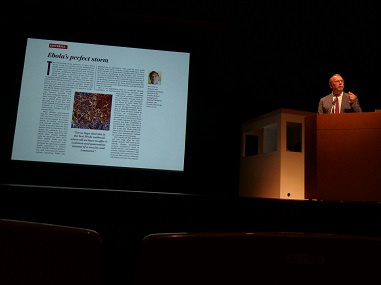
LSHTM Global Health Forum in tokyo, held by the Nagasaki University
The Noguchi Africa Prize ceremony at TICAD5 in Yokohama coincided with the creation of GHIT (the Global Health Innovative Technology Fund) by five Japanese pharmaceutical companies, the Government of Japan and the Bill & Melinda Gates Foundation. I joined the board of GHIT because this is one of the most innovative public-private partnerships which capitalises on Japanese know how to develop newvaccines,drugs and diagnostics for malaria, TB and neglected infectious diseases.
The Ebola crisis in West Africa has dominated global health news in 2014, when it appeared for the first time outside Central Africa, where I participated in investigating the first known outbreak in 1976. Ebola has taken up much of my time, and our School has been very active in various activities in West Africa.I could not imagine that this virus could generate such a major epidemic affecting three entire nations, with at the end of 2014 already over 7500 deaths – many times the total number of known deaths of Ebola since 1976.
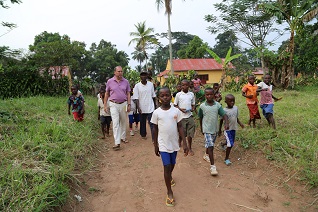
In February 2014, on a return visit to Yambuku,
DRCongo where the first case of Ebola was
identified and named "Ebola".Dr.Piot is walking here
with Sukato, one of the Ebola survivors
from the 1976 outbreak.
This tragedy shows in the first place that infectious disease epidemics will continue to threaten the world. Wherever an epidemic arises, it not only represents a major burden for the localpopulation, but can be a source of infections thousands of kilometres away. So, besides alleviating the suffering of the population of the affected countries, fighting Ebola in West Africa should also be considered a “global public good” which benefits the world as a whole. TIME Magazine honoured me as a Person of the Year as one of the “Ebola Fighters”.
Finally, a Japanese version of my memoir “No Time to Lose” will be published by Keio University Press early 2015, making it more accessible to Japanese readers.
Dr. Alex Godwin Coutinho (Uganda)
Laureate for the Second Hideyo Noguchi Africa Prize, Medical Services Category
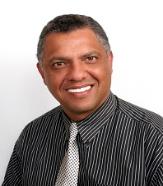
The Hideyo Noguchi Africa prize was awarded to me and Prof Peter Piot in June 2013. This was a tremendous honour to myself and to my country but most important of all to the millions of Africans who have benefitted from the work I have led over the years as well as those in the future that I will have the honour to serve.
HONOURS AND RECOGNITIONS
Since receiving the award I have been recognized by the Uganda government which awarded me the National Heroes Independence medal which is the highest award to civilians and was presented by his Excellency the President of Uganda, Yoweri Kaguta Museveni in October 2013. The Royal College of Physicians also awarded me the Fellowship of the Royal College of Physicians of the United Kingdom.
SCALING UP HEALTH SERVICES TO AFRICA
I have continued to scale up health services to millions of Africans primarily through the work I have led as Executive Director of the Infectious Diseases Institute. Since June 2013 we have tested over one million Ugandans for HIV and we have passed the 100,000 mark of HIV+ individuals supported by IDI to receive HIV care and medications. We also started up a male circumcision program that by the end of 2014 had circumcised over 130,000 Ugandans contributing significantly to HIV prevention in Uganda. I have also led a globally significant program called Saving Mothers Giving Life that has demonstrated in a catchment population of 2,000,000 that it is possible to reduce maternal mortality by up to 38% in a space of 18 months. This landmark program is now being used to scale up programs in other parts of Uganda and Africa. These and other HIV programs run by IDI under my leadership continue to reflect the ethos of the Hideyo Noguchi Africa prize - to ensure that knowledge and technology are translated to medical services for the millions.
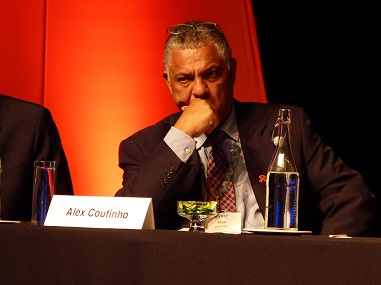
In addition at the end of 2013 I was selected by my Board peers to be the first African Chair of the Board of the International AIDS Vaccine Initiative (IAVI). IAVI seeks to ensure that an HIV vaccine is discovered and made available to the millions who need it particularly in Africa. Japan continues to be a donor to IAVI, in particular to support early trials of the SENDAI vector as a possible vaccine candidate. In my work as Chair of the IAVI Board, I continue in the footsteps of Hideyo Noguchi as he pursued vaccines to prevent diseases across the world.
SINCE OCTOBER 2014
In October 2014 I stepped down as Executive Director of IDI in order to free myself to be able to engage in broader aspects of global health and to progress the vision I have of the Hideyo Noguchi Africa prize. The prize has enabled me to stop formal employment and to have the financial means to engage in a whole range of efforts that will benefit the people of Africa. The following are the current activities I am involved in
- The Ebola epidemic has caused devastation in West Africa and I have led an effort in Nigeria to strengthen the preparedness of Nigeria in preventing the flare up of Ebola and to train frontline health providers in the early detection and containment of the Ebola virus. In November 2014 I spent 2 weeks in Nigeria meeting all stakeholders and setting the scene for a major training effort to start in January 16th 2015 around a new curriculum that I have adopted from the WHO, CDC and MSF curriculum and that is better adapted for Nigeria. In December 2014 I also participated in an awareness and fundraising drive for Ebola in San Francisco and we were able to present updated facts on Ebola to FACEBOOK headquarters, the University of California, San Francisco (UCSF), and the World Affairs Council. I have also started a FACEBOOK blog on Ebola in order to contribute to global understanding of the epidemic.
- In collaboration with UCSF I am participating in a major initiative to address the incidence of Pre Term Births globally. This 10 year program funded to the tune of $100,000,000 is designed to understand the causes of pre-term births and to put into place interventions to reduce its incidence as well as its outcomes. Pre term birth continues to be a major contributor to neonatal mortality which in turn affects Infant mortality rates. I will be leading the effort in Uganda while contributing intellectual input into the program in Kenya, Rwanda and USA.
- I have also started the process of investing the Hideyo Noguchi Africa prize into a post graduate training programme in Uganda focusing initially in the areas of mental health, Maternal and Child Health as well as tropical Medicine. I am currently completing the construction of a training facility in Kajansi, Wakiso district that can house 400 students at any given time and that can also be used by other entities interested in Global Health. I am also in discussions with various players in Fort Portal, Uganda to set up a rural Clinical and Research training site for post graduates who wish to experience the practice of medicine and public Health in rural areas of Africa. Both these facilities should be fully ready by end of 2015.
In summary the Hideyo Noguchi Africa prize has given me further global recognition as well as provided the financial means for me to be an independent global health leader able to contribute to a range of global current issues and influence the health of millions of Africans. I have also used every opportunity to speak about Hideyo Noguchi and increase global awareness of his life, his vision and his accomplishments which in turn brings recognition and glory to the people of Japan.
Invitation for Donations
for the Hideyo Noguchi Africa Prize Fund
As part of the prize money to be awarded for this prize, we are inviting donations widely from those who support the idea of this prize. Your goodwill donations will be used to support the activities of people who are playing active roles in improving medical research and medical services in Africa.
- Donations to Hideyo Noguchi Africa Prize (as of December 2014)
514,123,972YEN [Individual: 1,955,Corporation or Foundation: 328 (TOTAL2,283)]
If you wish to make a donation, please contact the Japan International Cooperation Agency (JICA), which is managing the Fund, by e-mail. The contact information is as shown below.
Citizen Participation Promotion Division, Training Affairs and Citizen Participation Department Japan
International Cooperaion Agency (JICA)
E-MAIL : jicata-kifu1@jica.go.jp
